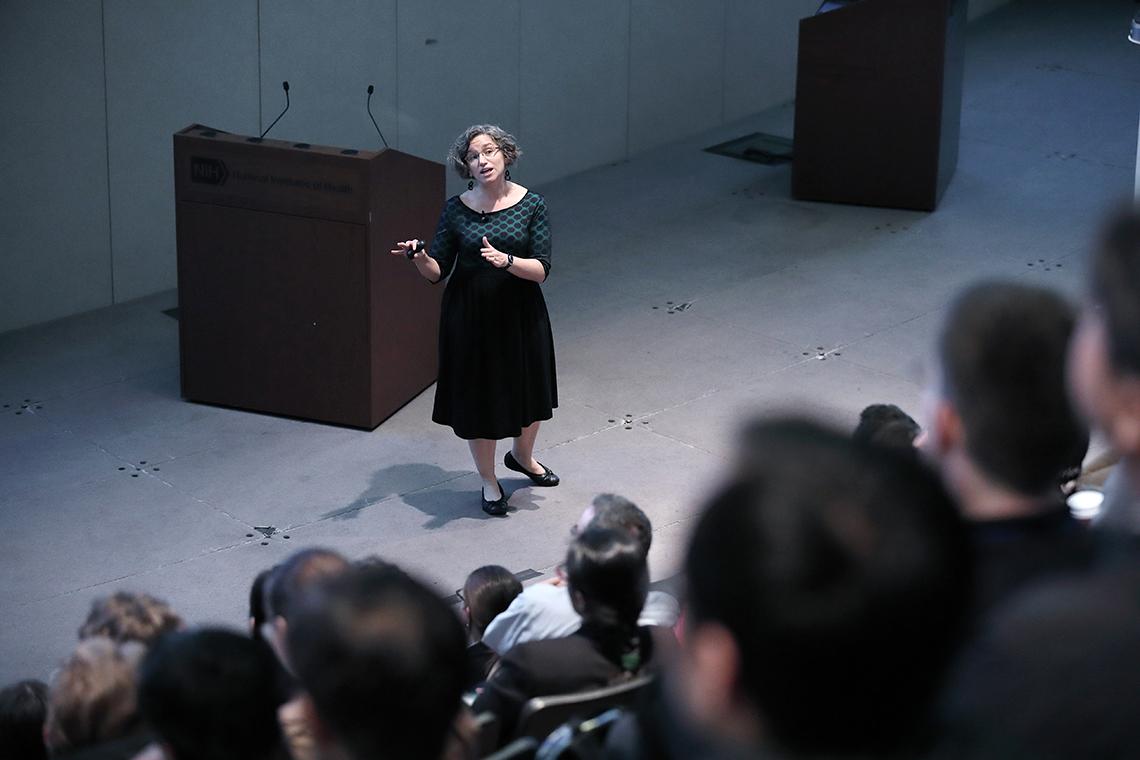Pobiner Takes Evolution Studies from Field to Classroom

Photo: Chia-Chi Charlie Chang
How did human beings evolve? Where did we come from? What did our prehistoric ancestors eat? And why is all that information relevant today? These are some of the questions that Dr. Briana Pobiner, keynote speaker at an NIDDK scientific conference, addressed recently.
Pobiner is a paleoanthropologist, research scientist and museum educator with the Human Origins Program at the Smithsonian National Museum of Natural History. She received a Ph.D. in anthropology from Rutgers University in 2007. Her area of research interest, which is evolution of meat-eating habits in humans, took her to Africa for field work on butchery with early stone tools. After having spent several months in the grasslands of Kenya, Pobiner has hypothesized that early humans often scavenged leftovers from kills by big carnivorous animals. In her talk, she shared her findings on the early food habits of humans before the advent of hunting.
There is evidence of meat in the diet of humans from as far back as 3.4 million years ago. However, hunting for food did not evolve until the invention of specific hunting tools, some half a million years ago. In the 3-million-year period in between these two events, prehistoric humans were predominantly scavengers, says Pobiner, who studied modern-day prey carcasses at the Ol Pejeta Conservancy in Kenya. Our ancestor Homo erectus would get many of the calories it needed from the leftover flesh of a big prey animal, she said.
That we evolved from earlier human species, such as Homo erectus, is still an uncomfortable scientific proposition for many. At the Smithsonian, Pobiner also leads the Human Origins Program’s education and outreach efforts. Her primary objective is to familiarize and interest the public in the concept of evolution.
These efforts have been successful in fostering respectful dialogue to dispel common misconceptions about human origins. The Hall of Human Origins exhibit at the Smithsonian helps visitors think in a scientific way about evolution.
In the latter part of her talk, Pobiner focused on the Human Origins traveling exhibition that appeared in 19 public libraries across the U.S. from April 2015 to April 2017. The sites were chosen deliberately, targeting some regions of the country where acceptance of evolution is a challenge. The exhibit welcomed people from diverse communities into science conversation and included workshops for teachers. Public response to the initiative was encouraging, with 73 percent of the skeptical participants later reporting that they ended up enjoying the exhibit and about half of them saying they learned something new.
Another focus of the education and outreach efforts is to present the concept of human evolution in high school classrooms. This was a challenge because fewer than 40 percent of high school students accept the theory of evolution, Pobiner said. Goals of the initiative were to create evolution-centered curriculum units and teaching resources for high school teachers. Classroom activities included discussion about evolution and promoted innovative methods, such as historical role play, which eventually became highly popular among students.

Photo: Chia-Chi Charlie Chang
Understanding and acceptance of the science of evolution by these high school students, some of whom had previously rejected the concept, has been a remarkable achievement of the education and outreach effort of the Human Origins Program. But there are large parts of society, predominantly among adults, where religious concepts overrule the acceptance of scientific findings. Pobiner admits it is not always possible to reach everyone.
In the Q&A session following her talk, it was asked, “How is the U.S. unique in science education?” Pobiner said the U.S. ranked second from last among 34 countries in acceptance of evolution, according to a 2005 survey. The U.S. is also the only country where an anti-science approach is politicized.
